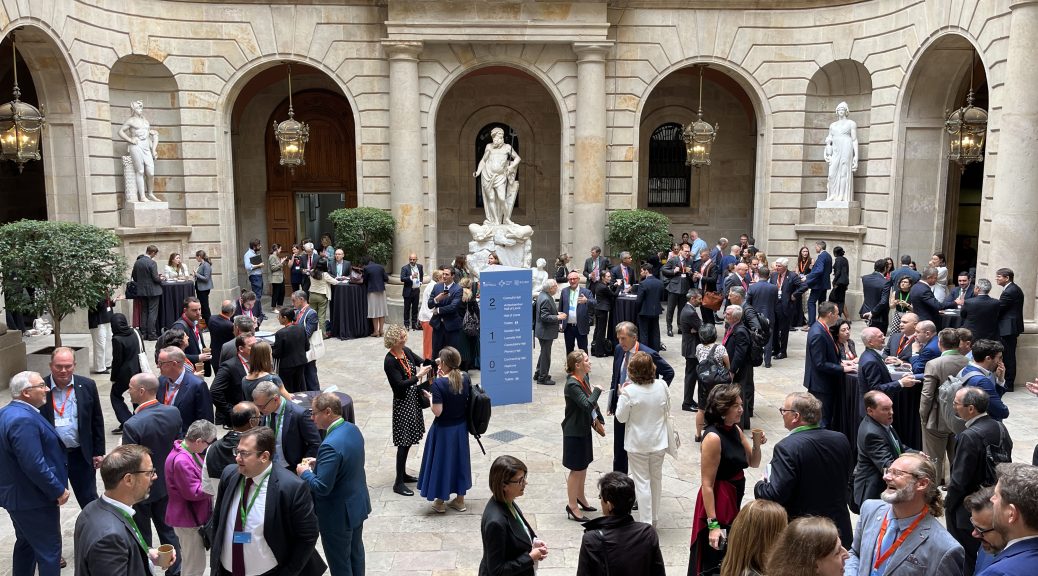
Conference Debriefing (39): International Competition Network 2023
PDF-Version: Click here
Suggested Citation: Podszun, DKartJ 2023, 81-86
What do competition law enforcers actually talk about when they meet? We sent Rupprecht Podszun to listen in at the International Competition Network’s Annual Conference, this year in Barcelona. Here is his conference debriefing in the form of an interview, revealing – inter alia – missing film titles, a funny misunderstanding and a new topic for antitrust enforcement.
Name of the event: Annual Meeting of the International Competition Network (ICN)
Place & time: La Llota de Mar, Barcelona (a beautiful old building, yet with miserable acoustics in the main hall), 17-20 October 2023
Host: Cani Fernandez, leader of the Spanish competition authority CNMC, was an excellent local organiser. Simply everyone loved the food! Andreas Mundt of Bundeskartellamt is, of course, the ICN Chairman, re-elected this year for another 2-years-term. Kudos to the CNMC team, and – from a German perspective – to the international team at the Bundeskartellamt: Barbara Schulze, Olaf Wrede, Mirja Schmitz-Hübschen and Christina Burhop.
Audience: Competition enforcers from 98 jurisdictions, spanning from Albania (Commissioner Leida Matja) to Zambia (Senior Investigator Maggie Phiri). It’s mostly very senior, with Lina Khan from the US, Reiko Aoki from Japan, Ravneet Kaur from India or Frédéric Jenny of OECD. Notably missing: China; not a member of ICN. Everyone else is there.
If ICN is an enforcer meeting what the heck were you doing there? Your times at the Bundeskartellamt are long gone, right?
True, but ICN invites so-called “Non-Governmental Advisers” (NGA) to join the party. Each agency can nominate some people. I guess the enforcers know quite well that power needs control, and thus we are like mavericks entering their highly concentrated markets of monopolistic anti-monopoly actions so they remain innovative, efficient and do not become complacent…
Are you sure that all NGA want ever more efficient competition law enforcement? I see the names of company representatives on the list of delegates and big names from Big Law!
Ohhh, come on, we are all in it for the higher good! Even partners in law firm have this basic instinct that free competition is a great thing, and also, you never know on which side you end up earning your billables! Economist Cristina Caffarra was there, too, she is living proof that top-advisers can counsel Microsoft at the same time as being the most vigorous critics of Big Tech. Luckily, she discloses her affiliation first thing. Just to make sure, we were handed different ribbons for our name badges. Enforcers got orange, advisers green, the press pink. Outspoken professor Marek Martyniszyn of Belfast University suggested to hand out ribbons in “alarm-red” to company representatives next time.
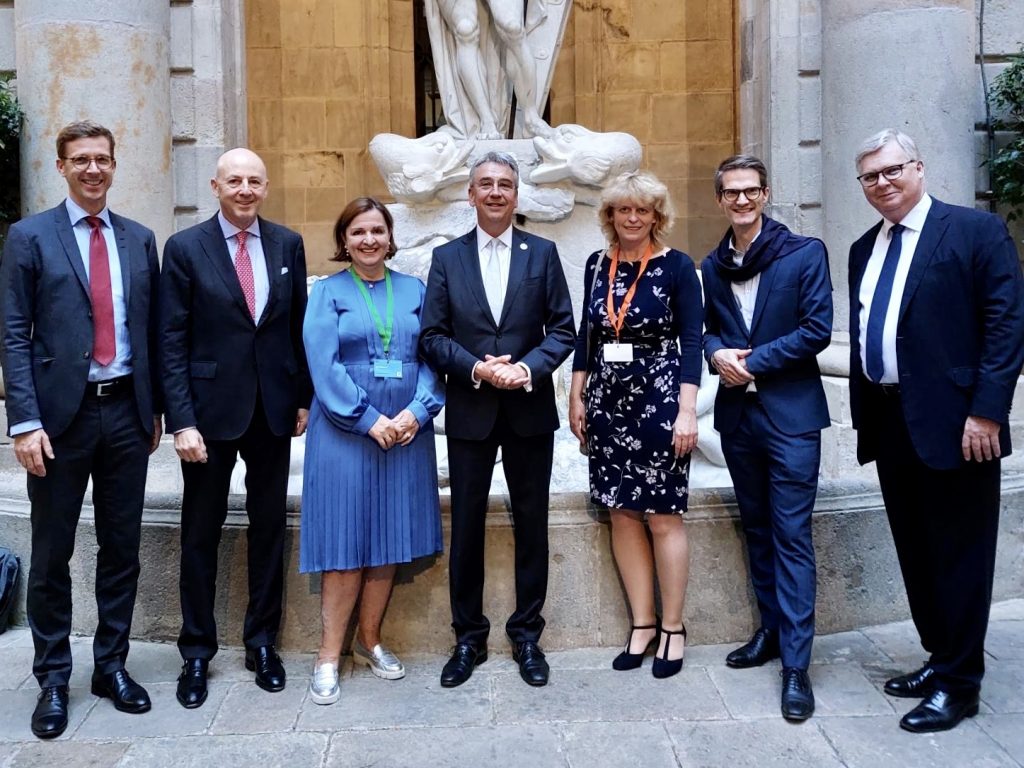
Let’s turn to the monopolists again, they are more interesting than you academics with your crazy ideas. How was the general feeling?
At the end of the conference, shortly before it was announced that ICN 2024 will take place in Sauipe, Brazil, Andreas Mundt said: Globalisation will continue, not least due to digitisation. But the blocks are drifting apart in politics. We, as a competition community, need to stand together! If Mundt was not that friendly pragmatic this would have been the moment to wipe your tears away. Repercussions of world events can be felt in competition (with problems due to war, energy prices, inflation, walled-off markets and heavy state-involvement). But also, there is a certain lack of belief in multilateral solutions.
You mean that no one dreams of the World Competition Agency anymore?
ICN was founded in 2001, and it has achieved remarkable progress ever since. If you see how enforcers from all over the world discuss concepts of dominance or publish handbooks on best practices, it is heart-warming, and I mean it. They have established incredibly good relations and a common understanding of most issues. But it is not the full thing. You know Eleanor Fox?
Of course I do! The legendary professor from New York – wait, she got her degree in law at NYU in 1961, and was the first female partner of Simpson Thatcher Bartlett in 1970… Man, she travelled to Barcelona? What for?
She is still younger at mind than most of us, I tell you. It was hers to say: For the mega world mergers we need a world enforcement forum where we discuss the effects. Her case in point was the Bayer/Monsanto deal. Once that was approved in the US and the EU, it was clear, so she said, that the Global South could not stop it. The developed countries let the less developed ones down in this case since the issues of this merger in Africa were not a topic in EU merger control, for instance. Better to discuss this case in a global forum of enforcers while being on the case. Mor Bakhoum, a professor from Senegal, spoke of a “regional clearinghouse” for such mergers.
Interesting idea. Why did they look into Bayer/Monsanto at all? That merger was closed in 2018…
Cold case, but it has a close connection to the big new topic at ICN: Food! It was a most interesting panel, moderated by Simon Roberts (University of Johannesburg), that inaugurated this topic (which once was put on the agenda by Ioannis Lianos, the professor-turned-head of agency, by the way). Now it is so important, and globally. Willard Mwemba, CEO of the COMESA Competition Commission, said: You can discuss digital and sustainability and everything, but if you are hungry food is what counts first.
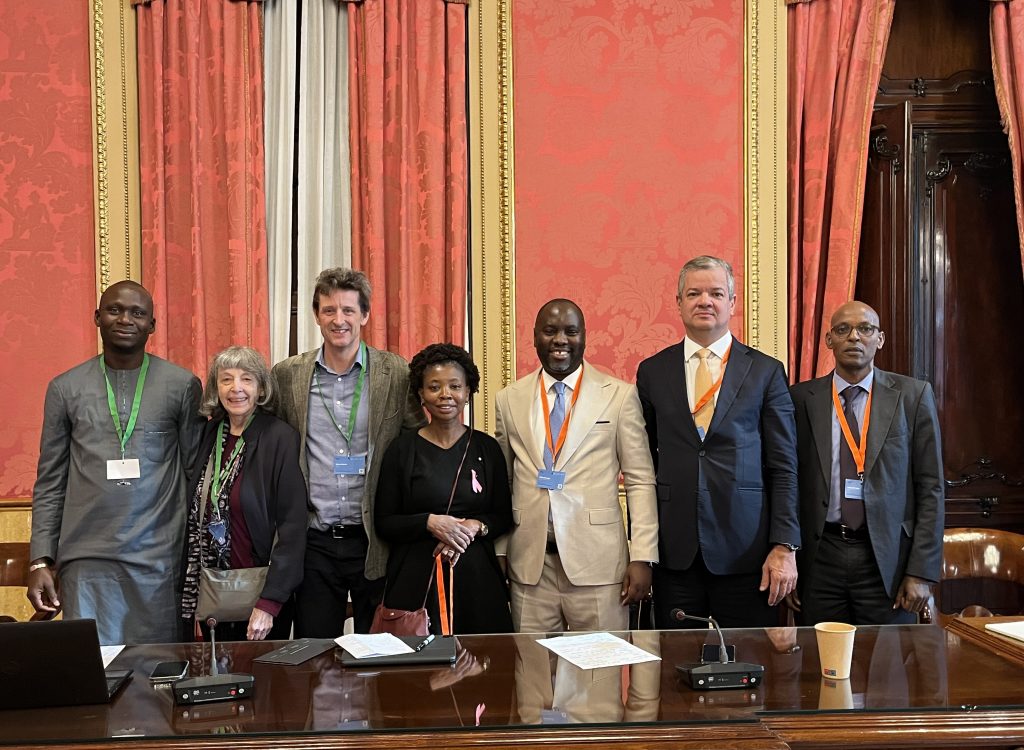
Sounds right. Apart from the fact that sustainability plays a role for global food…
Granted. ICN will work on food and agriculture now, and this affects the developed world as well. As one president of a competition agency remarked from the audience: Whatever the EU decides in agriculture, directly affects our markets. There were rich arguments on high consumer prices, problematic government policies, low income for farmers, fertilisers and grain imports. The problems are not for developing countries only. Mwemba for instance spoke of “creeping mergers”, as he called it very vividly, in the farming markets: If you look at each one at a national level, they seem okay, but if you see the pattern from a regional level after a while you see the damage done.
Oh, that sounds familiar for Germany, indeed!
And that is the good thing: In every panel you can learn something, and it is not a one-way-street. This is the place where you see the powerful heads of agencies, sitting in discussions, listening closely, taking notes and engaging. It is not the “We give a keynote and leave five minutes later”-approach that is common in some conferences for the VIPs. At ICN, people like Andreas Mundt, John Small (New Zealand) or Alexei Ghertescu (Moldavia), to pick just three names by coincidence, are in a learning experience.
Hm, I would be interested in the notes Andreas Mundt took…
I saw him sitting in our audience when we had a panel, but I am not sure we had anything new for him… We were discussing the intersection of privacy and competition. What news is in that for the head of the agency that kicked off the whole debate with the Facebook case? This was the “Intersection Panel”. Oh, by the way, we had funny misunderstanding on this one…
Tell me!
Professor Maurice Stucke worked on the ICN Handbook on this intersection, and when we were talking in a lunch break he advertised our panel to the head of an agency as “the intersection panel”. That head of agency looked at me and said: “The intersexual panel?” His voice and his looks were completely unflinching. I cracked up. He did not at all seem surprised what kind of issues come up in antitrust debates these days.
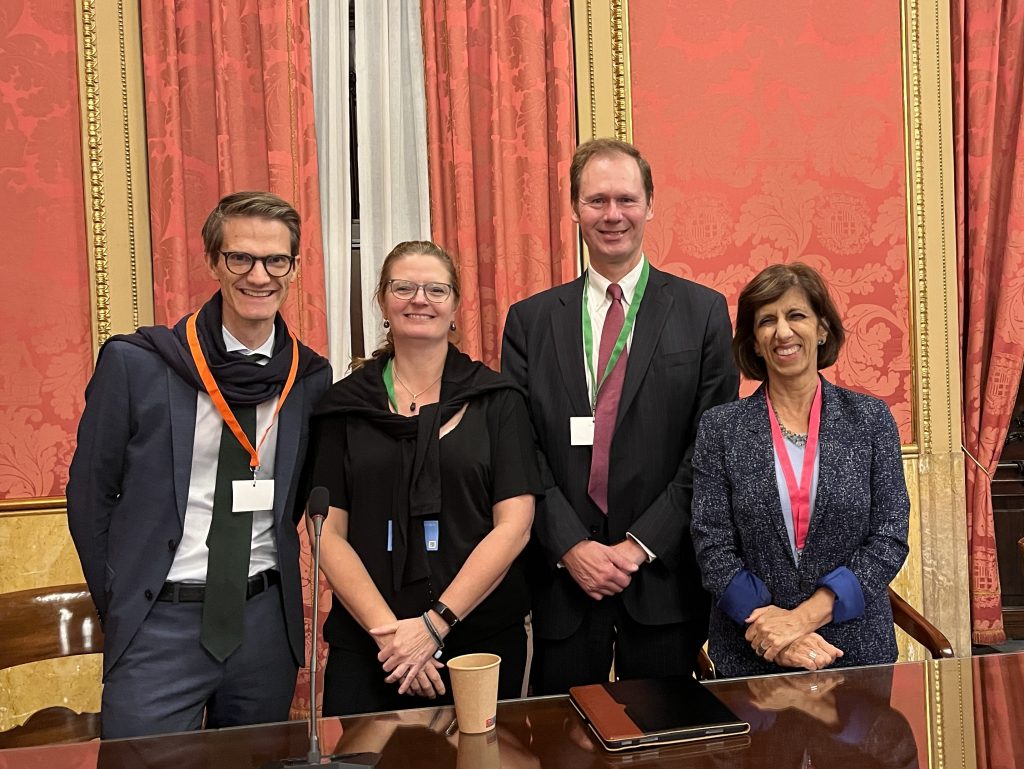
Haha. So, any news from that, eh, intersection?
From an EU perspective, the first German decision on substance on section 19a is quite interesting – Google committed itself to introduce the data silo rules that are in Art. 5(2) DMA for services not covered by the DMA. You know that section 19a is the special German competition rule for undertakings with paramount significance across markets. The Bundeskartellamt is a first mover again, this time in applying the DMA, sort of. Panel chair Andrea Coscelli wanted to know whether you can buy off the right to privacy, e.g. by offering services eating less data but charging fees instead. The panel was pretty uniform in holding this idea to be contra legem. Maurice Stucke who wrote the book on “Competition Overdose” with Ariel Ezrachi pointed out that there may be situations where competition and privacy are at odds, where more competition does not lead to more, but less privacy. The debate on privacy is moving forward since the topic moves from clear consumer-related services like Meta’s to the industrial side where access to data is a key topic. Competition and innovation call for more data exchanges, but if GDPR-protected data is involved, as will often be the case, there is a potential for blocking.
The DMA will surely cure some of the issues with Big Tech.
When Cristina Caffarra was asked this on a panel she did not even wait for the end of the question before saying declaring ex cathedra: “No!” Benoit Coeuré, the French head of agency, spoke in his 15-minutes-interview on the main stage of adjusting the DMA “rather sooner than later”, for instance by including cloud services. The DMA will not cure market power mistakes that were made years ago, so Caffarra said. Market definition no longer represents the problems we face, and she took the merger of Amazon/iRobot for illustration. We hear that merger control may also feature in the next German competition law amendment #GWB12 which is due for this legislative term, and I am curious what new ideas get into the law on merger control. Law firm partner Ingo Brinker of Studienvereinigung Kartellrecht sat on that same panel with his unflappable calm. He ended his talk on merger control stating: “Schau’n mer mal”, a Bavarian slogan carrying some of that Franz-Beckenbauer-attitude, translated by Brinker into French as “On verra”. Not sure that it conveys the same notions in French.
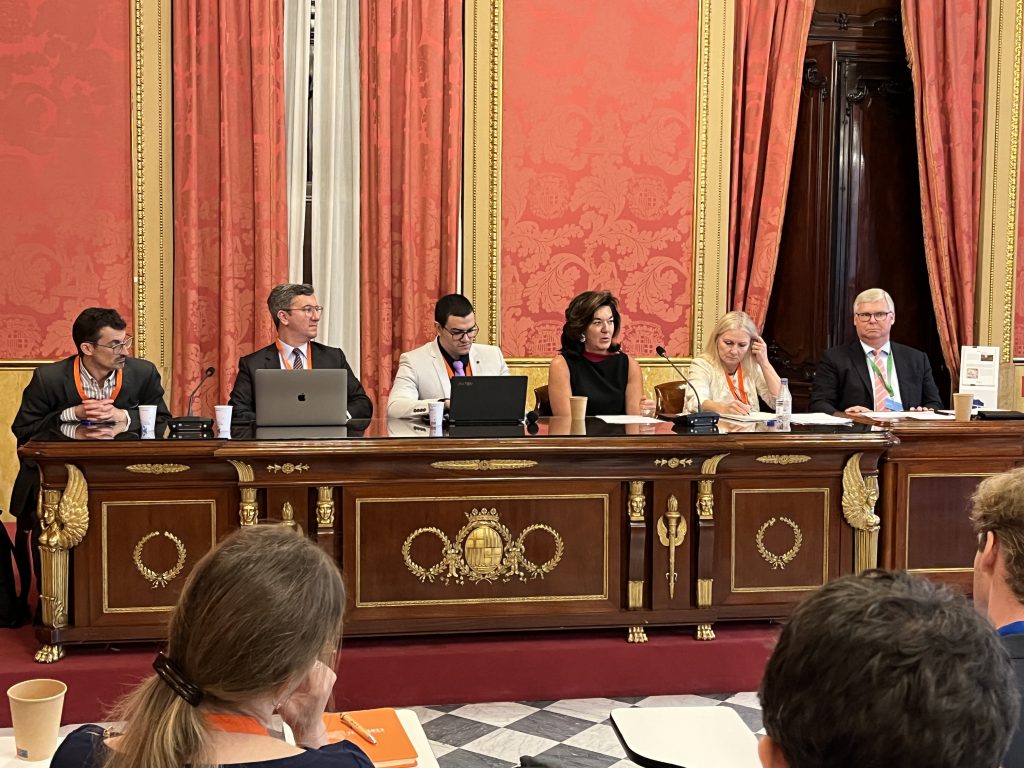
Okay, we have food as the new big thing, digital as the coming-of-age topic, now what about sustainability?
Good question! It did not feature in one of the main plenary sessions, but there was an exclusive head-of-agency-meeting on this. Maybe they discussed the backlash against green policies, that is now often talked about. I met Martijn Snoep, the head of the Dutch competition agency,…
I know him of course – he is Mr. Sustainability!
Shhhh! Please stop saying that! “I feel like a Hollywood actor who always has to play the same villain or the same romantic lover – I am always casted as „Mr. Green“”, Snoep said. His activities, and those of his agency, have certainly led to a much better understanding that competition and sustainability are reconcilable. But Snoep is so talented he can play other characters, too. Spencer Weber Waller, the Chicago Loyola professor who keeps entertaining by drawing on his vast knowledge of movies for antitrust references, would probably know exactly what that new movie featuring Martijn Snoep in a different role will be. The plot is this: National competition agencies in Europe need a better tool for fighting market power, something like the EU’s formerly planned New Competition Tool or the new German Section 32f. UK has it, Sweden wants it, too, Snoep is at the forefront of campaigning. But he also sees the risk of this New Big Thing for national competition agencies: “There may be a fragmentation of the internal market.” Coming to a theatre near you, soon!
There was an advocacy award, at least, for combatting climate change.
Yes, the World Bank’s Graciela Miralles hands out awards for best advocacy every time in several categories, one was for supporting climate change. Japan’s Fair Trade Commission won it for its Green Transformation guidelines. These awards showcase what is happening around the world. For instance, Peru’s Instituto Nacional de Defensa de la Competencia y de la Protección de la Propiedad Intelectual engaged in a campaign with universities and professional associations to eliminate market barriers, and managed to get rid of more than 700 barriers by voluntary removal. The CNMC in Spain took home an award for an initiative to raise awareness with staff in local authorities that frequently intervene in urban mobility, infrastructure or telecoms markets. A big winner is also Central America with Costa Rica, El Salvador, Guatemala, Honduras, Nicaragua, and Panama – they have established the Central American Competition Committee and approved a regional competition regulation.
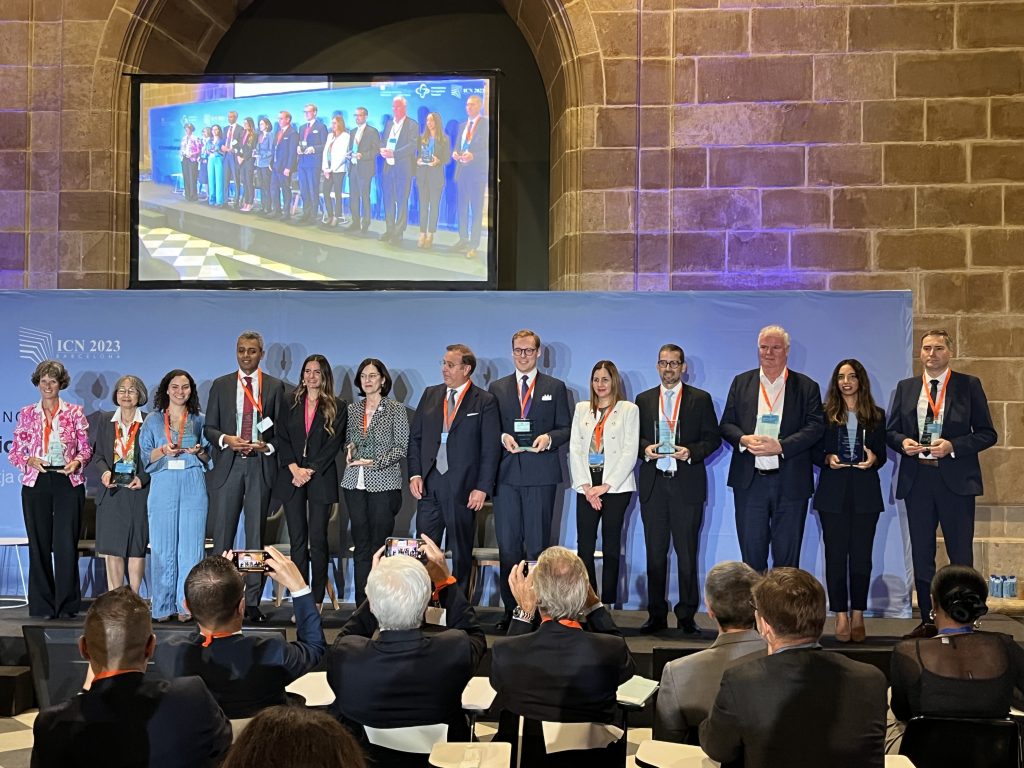
So, all good on the agency level?
There was an interesting empirical ad hoc study, if I may say so. In one plenary, priority setting was discussed with Csaba Balász Rigó from Hungary, Samuel Chan from Hong Kong, Sia Aik Kor from Singapore and Bill Kovacic, no introduction needed. The audience was asked to answer two questions online: (1) What are the key trends and areas which agencies should focus on in the next two years? (2) (for enforcers only): What are the top factors to select key focus areas? On the first one, digital markets/platforms got most votes from agencies (while non-agency voters opted for AI/Machine Learning as the top priority). But the result of the second question was more striking: As the top factor for choosing priorities the most votes went to “Harm to market competition, consumers, and/or businesses”.
What is striking about that?
The other end of the table: Only 8% of agency voters subscribed to the factor “likely effectiveness of the agency’s action”. Asked whether he was surprised by the results, Bill Kovacic said: “I have seen this film before.” But then, the former FTC Chairman has probably seen more films in life than you and me together. The acoustics in that cathedral of competition were so poor that I did not catch the title of the film Bill has seen before. Probably, Spencer Waller needs to help me out on this again.
I notice that you have not yet mentioned any people from the EU Commission.
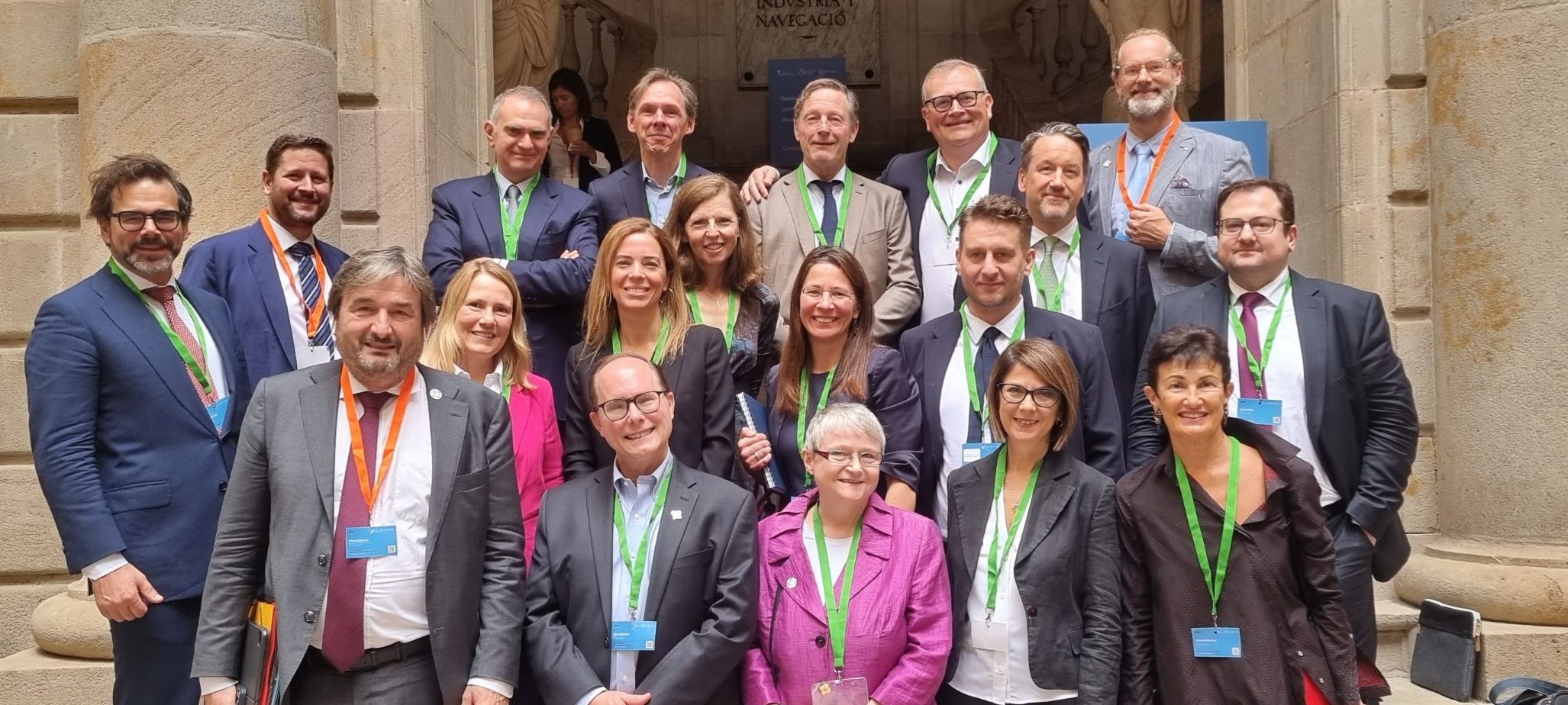
Oops, that was not intended, but this takes me to a delicate moment in the social programme. Olivier Guersent was there, the Director General, I also spotted Guillaume Loriot, Inge Bernaerts, Julia Brockhoff, Tobias Maass and others, and they had a great team of Non-Governmental Advisers (see picture – you will know them all!). Unfortunately, I was late for Didier Reynders’ speech. The Belgian is the stand-in-Commissioner for Margrethe Vestager while she’s courting European governments to head the European Investment Bank (EIB).
Right, what is actually the state of play there?
I am not one of those Brussels pundits, please consult the Politico/Parr/Mlex/Reuters correspondent of your choice for that! But of all people, the dinner speech at the Barcelona ICN was given by Nadia Calviño, the Deputy Prime Minister of Spain and Minister of Economics. So, there were excellent reasons to have her, but then she is also the main contender of Vestager in the race for the EIB top job. Did not feel too awkward though, there were lot of hugs when she came – remember she had been part of the competition bubble for years, not least as a deputy director general in DG COMP.
So either way, we will probably see an experienced competition enforcer at the helm of the EU bank that handed out € 65 bn. in 2022. Good sign, I guess, in times of growing appetite for industrial policies.
Two impressive careers. Speaking of great antitrust enforcers: When I googled searched for Canada’s Matthew Boswell who chaired a panel on challenges and trends in cartel enforcement, I found a portrait of him in the Financial Post that I highly recommend to read – it’s gripping!
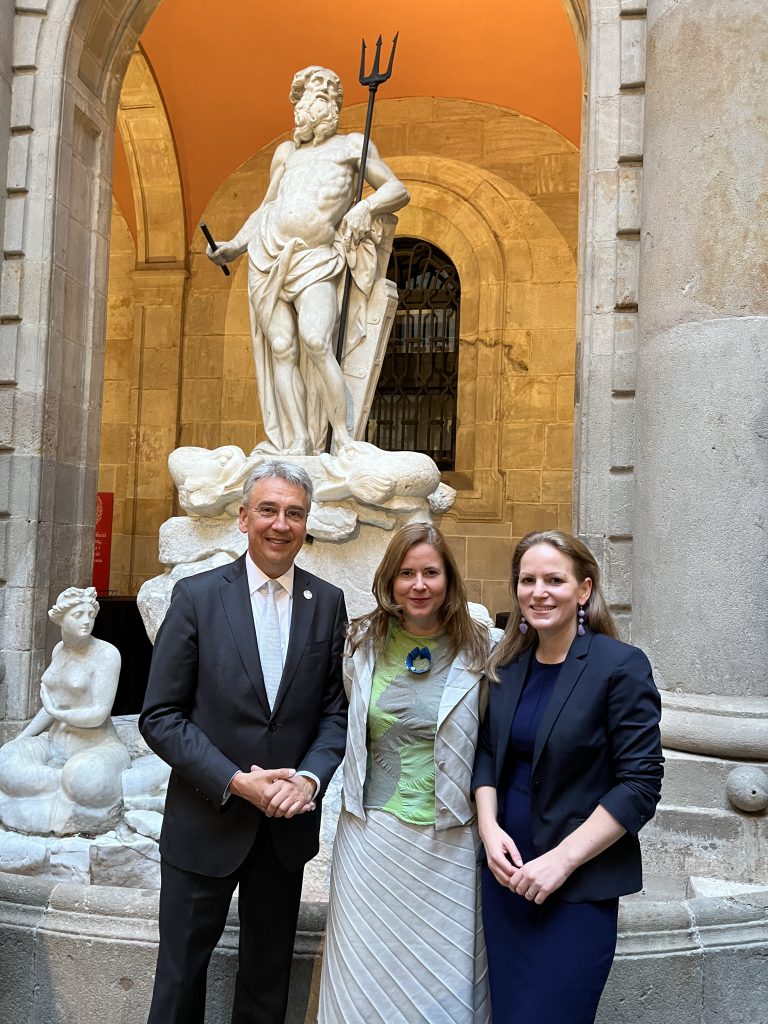
I was also excited to see for the first time since their respective nominations Laura Baudenbacher (Switzerland) and Natalie Harsdorf-Borsch (Austria), two women who took the top jobs in our neighbouring countries. (To be exact: Harsdorf-Borsch still needs the “Angelobung”.) Actually, Concurrences, that e-mail-nuisance rich antitrust trove offered a free copy of a book called “Great Antitrust Enforcers” to all participants. It contains the oral history of 25 enforcers, edited by Bill Kovacic. For instance, I learned from the interview with John Fingleton (who also happened to be in Barcelona) that the famous break-up of British airports by the OFT under Fingleton’s lead had a history in Ireland where Fingleton had worked before:
“The [Irish] Minister of Transport called me in for lunch one day, and he was having an awful problem with the company running the airport. He said: “What could we do?” I said, “Well, you could break them up, but they wouldn’t like that.” I explained how it might be done, and what benefits it would bring. And so, he did.”
Does the German Minister for Transport follow your blog? Asking for a friend who travels by train quite often…
Haha. If you get one message from the ICN yearly gathering it is this: It’s a people’s business. The people in that competition community are friends of open markets, and they are friends with each other, and that is so incredibly helpful. When people part after a final round of tapas, with their ICN Barcelona 2023 bags, waving good-byes and besitos petons, promising to meet again in ICN workshops, in courtrooms (or at the beaches of Bahia next year), you feel what Andreas Mundt said: This block needs to keep together. Barcelona!
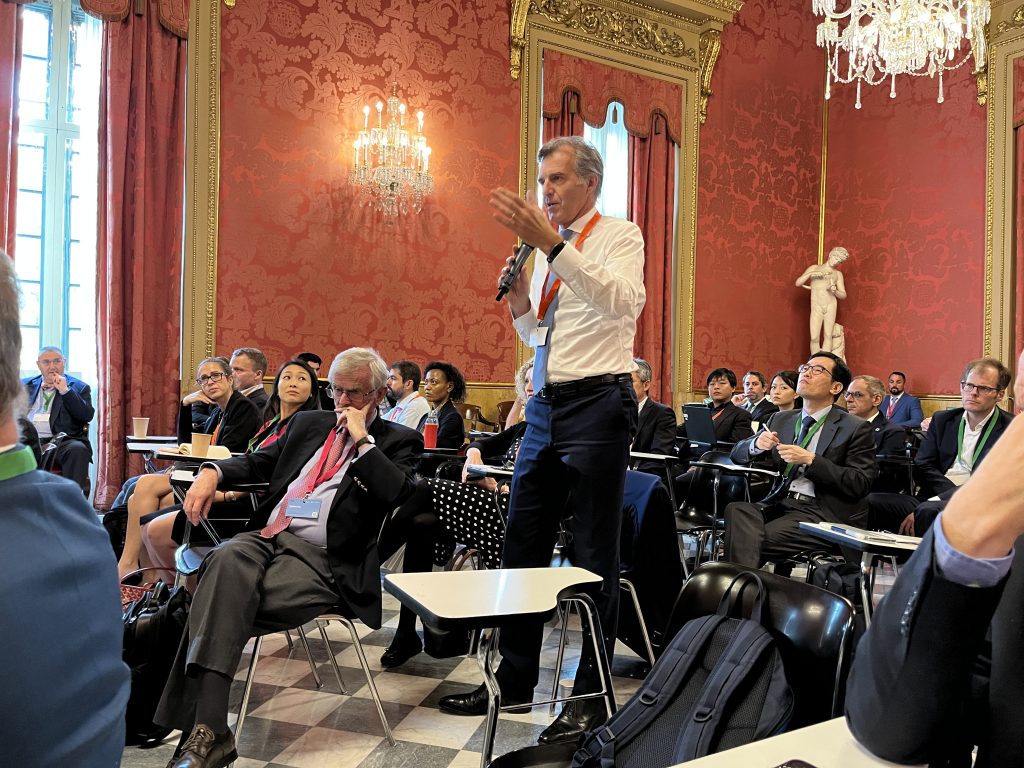
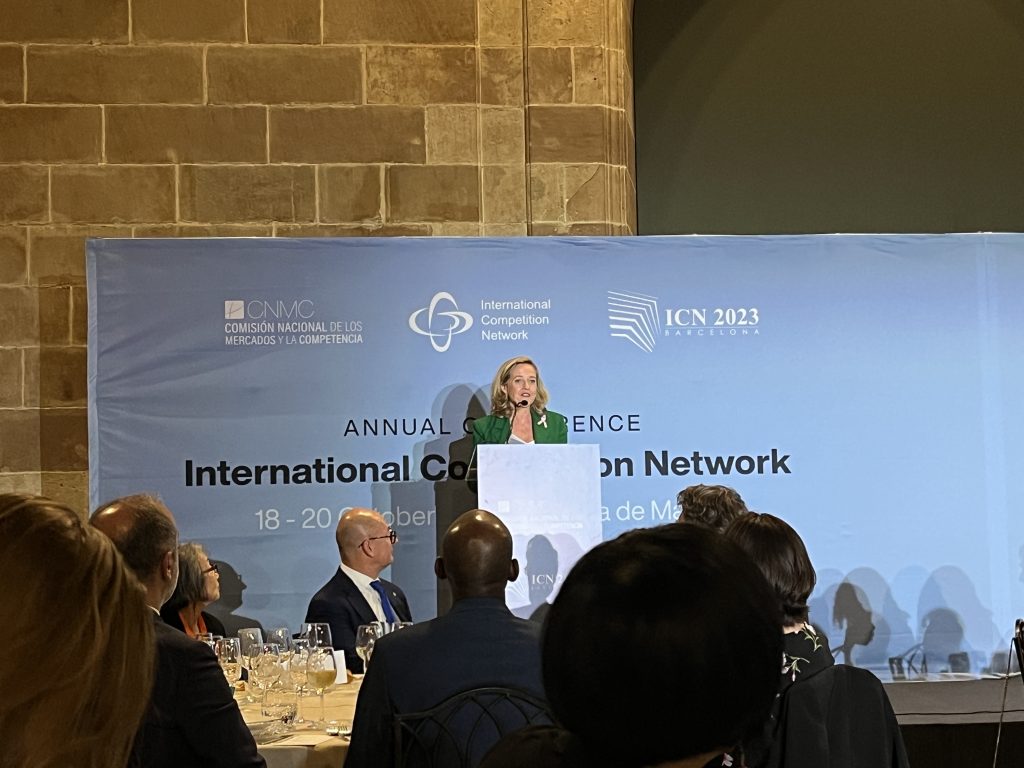
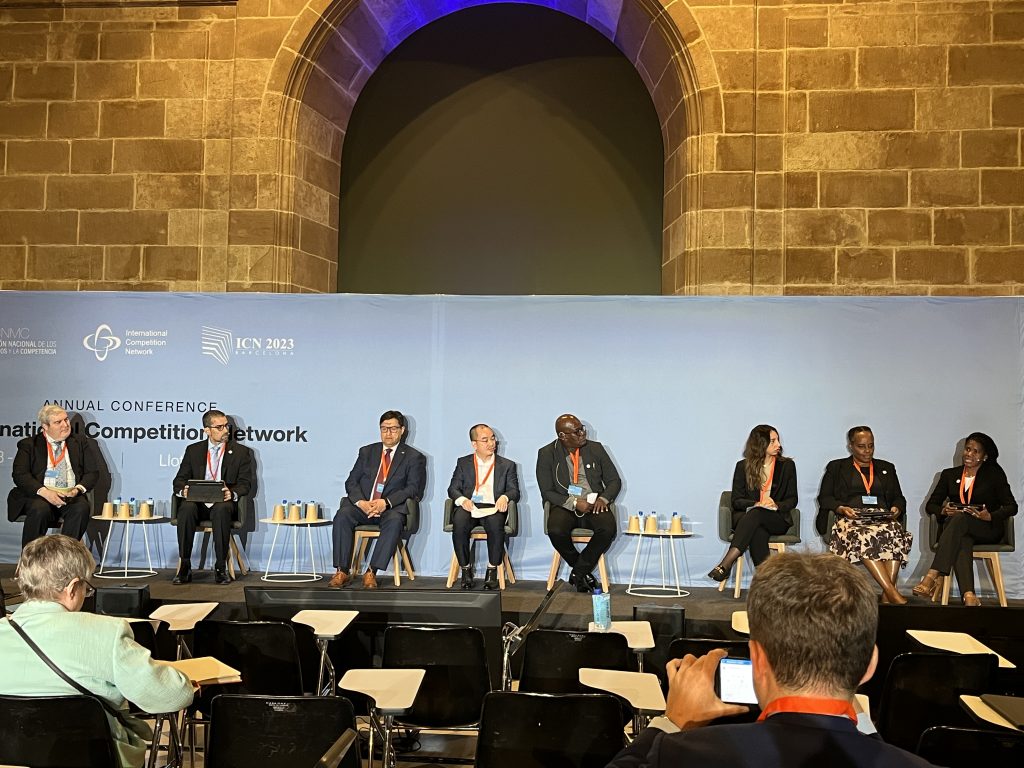
Professor Rupprecht Podszun is the director of the Institute for Competition Law at Heinrich Heine University, Düsseldorf, and the Chairman of the Academic Society for Competition Law (ASCOLA). If you like our posts, you may want to subscribe to our newsletter. Also, please feel free to comment and to share with colleagues!
Ein Gedanke zu „Conference Debriefing (39): International Competition Network 2023“